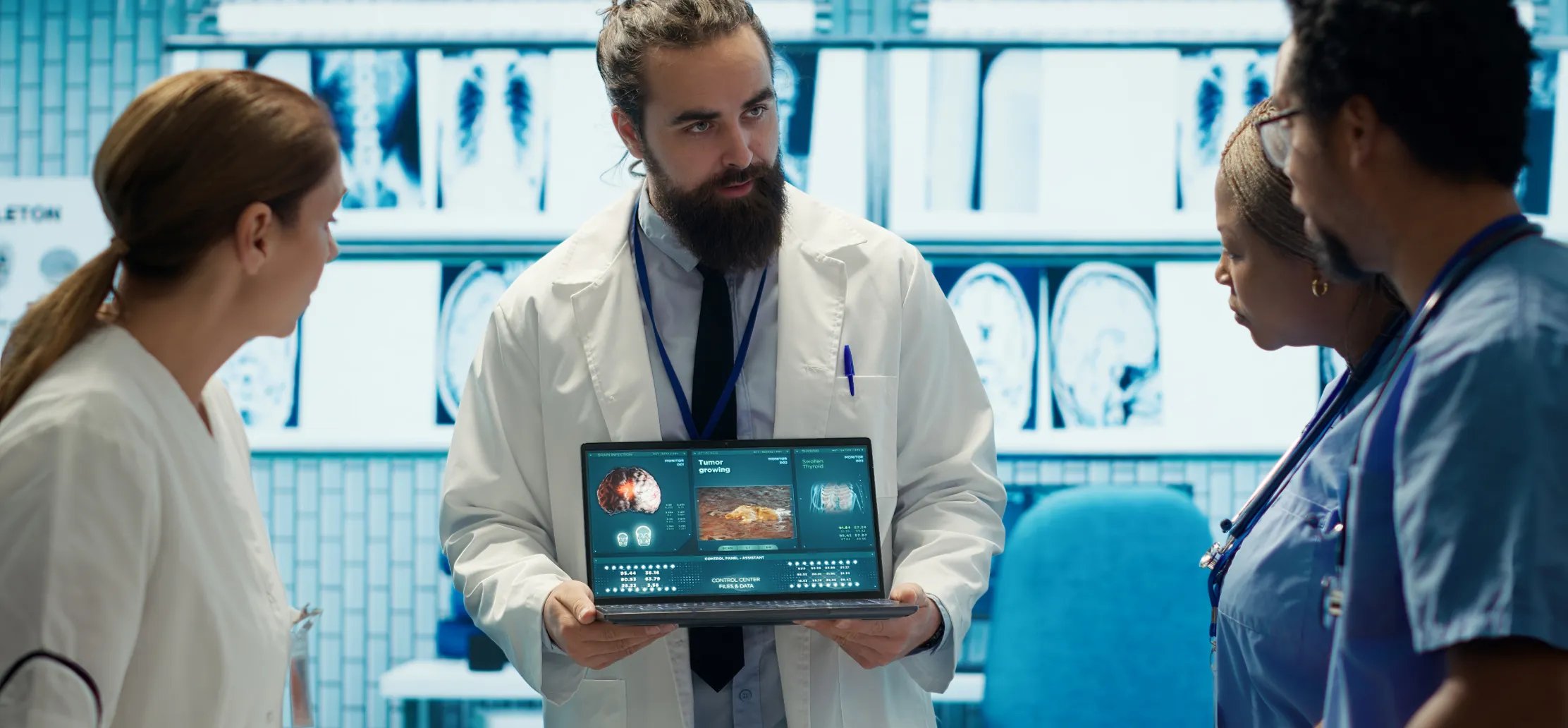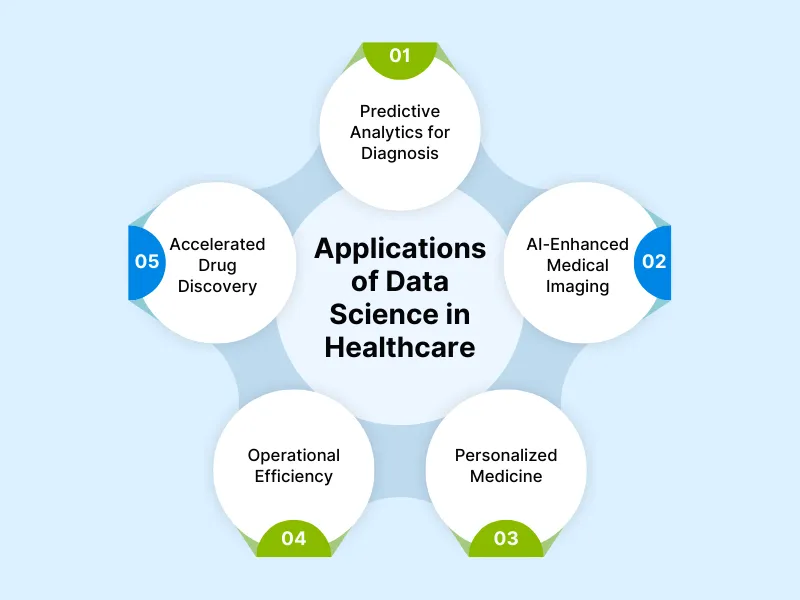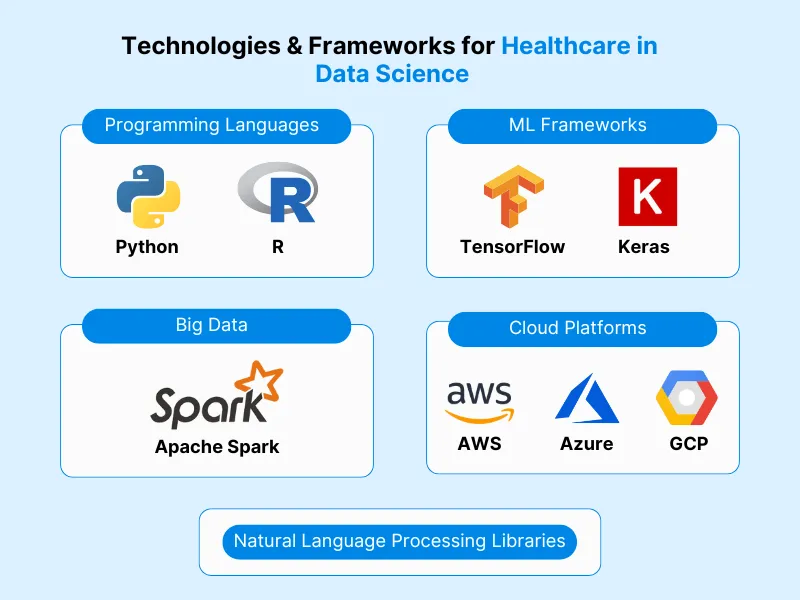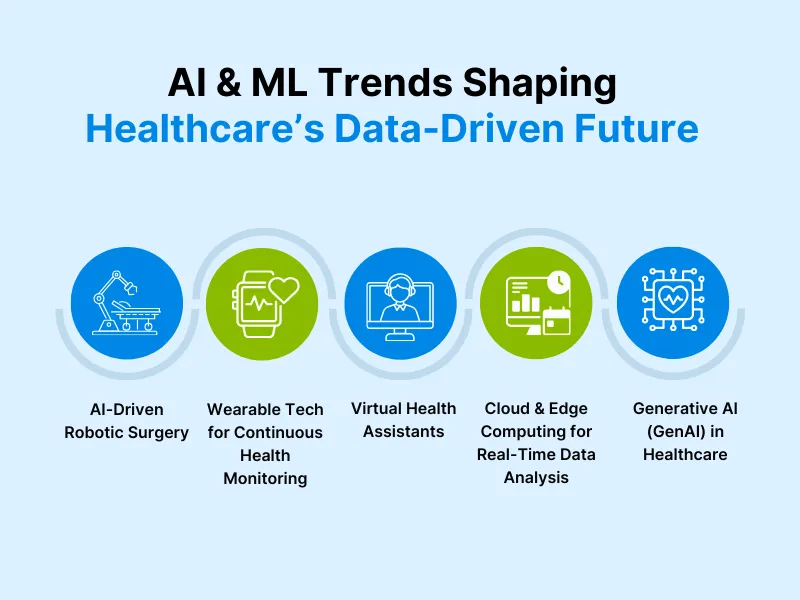Data Science in Healthcare is Optimizing Patient Care With Custom Solutions
This blog on Data Science in Healthcare will drive you through the various modern concepts and innovative methodologies on how to leverage advanced analytics and machine learning algorithms to their fullest potential to transform patient care, optimize treatment outcomes, and streamline operations.

We all live in a world where data shapes most of our core decisions and drives technological innovations to become the heartbeat of progress and digital transformation.
Undeniably, data is the staple food for the healthcare industry and the concrete stone that paves the way for innovative treatments, personalized care, and life-saving advancements.
But do you know that most of the data produced by healthcare institutions are mainly raw insights? You need an advanced and result-oriented process, such as data science services to transform that uncooked data into actionable insights. This will enable healthcare professionals to predict patient needs, streamline operations, and rapidly develop targeted therapies.
The Growing Role of Data Science in Healthcare
Data science continuously evolves and revolutionizes the healthcare and life sciences industry by delivering real-time personalized, efficient, and proactive patient care. The customized solutions help medical practitioners unlock deeper insights, improve diagnosis, and optimize patient outcomes.
Healthcare professionals can harness the power of data to make smarter decisions, leading to accurate treatment, and faster patient recovery.
“We’re using data science from discovering what drives a disease to make medicines available to patients,” says Najat Khan, Chief Data Science Officer, at Janssen Pharmaceuticals.
This statement from the Global Head and Vice President of Strategy & Operations for Janssen Research & Development underscores the sheer significance of data science in the healthcare sector.
Also, when you read our insightful blog, you will comprehensively explore and understand how data science is digitally transforming and innovating the different facets of healthcare industry, allowing medical researchers to efficiently manage clinical trials and drug discoveries.
The Significance of Data Science in Healthcare
Data science consulting is revolutionizing healthcare by enhancing decision-making, improving patient care, and streamlining operations. The ability to analyze vast datasets, including patient records, genomics, and imaging, is driving this transformation. According to a McKinsey report, data-driven healthcare could save up to $300 billion annually in the U.S. through efficiency improvements and personalized treatments.
The rise of predictive analytics allows clinicians to make more accurate diagnoses and treatment plans. Deloitte highlights how machine learning algorithms are helping predict disease outbreaks and patient readmission rates, leading to better resource allocation and patient outcomes. Data science is also fostering precision medicine, enabling tailored treatments based on individual genetic makeup.
Operational efficiency in hospitals is another key area where data science is impactful. PwC notes that healthcare providers are increasingly using artificial intelligence algorithms and other emerging technologies to optimize workflows, reduce wait times, and lower costs, contributing to better patient satisfaction. For example, a recently published article states that 77% of healthcare services prioritize AI, while 43% prefer IoT.
As healthcare embraces data science, the future holds even more potential for innovations that will further transform how care is delivered, making it more personalized, efficient, and predictive.
We also came across a PubMed article on the role of data science in healthcare which mentions that data science has the potential to revolutionize healthcare by providing insights and improving decision-making. It also highlights the importance of big data analytics and its role in transforming healthcare by delivering real-time insights that can improve patient care and reduce costs. Data mining, on the other hand, helps to detect disease during outbreaks.
Role of Custom Software Development in Integrating Data Science into Healthcare Systems
Customized software development is essential for effectively integrating data science into healthcare systems. It allows healthcare organizations to build tailored solutions that meet specific needs, such as patient data management, predictive analytics, and personalized treatment plans.
According to Grand View Research, the global Healthcare IT market is expected to reach $1,834.3 billion by 2030 at a CAGR of 15.8%. Well, this is quite evident and obvious as custom software development is enabling healthcare providers to seamlessly integrate large datasets from various sources like EHRs, lab systems, and wearable devices. This fosters more accurate analysis and insights.
Data science in healthcare industry is being empowered by various types of software solutions, including electronic health records (EHR), electronic medical records (EMR), telemedicine, clinical trial management, medical imagining, e-prescription, practice management software, and many more.
Furthermore, custom-built platforms ensure compliance with healthcare regulations like HIPAA, ensuring data security and privacy. Ultimately, custom software enables better decision-making, improved patient outcomes, and streamlined operations within healthcare environments.
Unlock the Potential of Data Science to Transform Patient Care With Precision
Leverage real-time insights to enhance healthcare efficiency
Applications of Data Science in Healthcare

Data science services are revolutionizing healthcare by enabling data-driven decision-making and enhancing personalized treatments. From predictive analytics and medical imagining to improving patient outcomes and identifying disease patterns, it covers diverse use cases and offers vast applications.
By leveraging machine learning, big data, and AI, healthcare providers can enhance diagnostics, streamline processes, and deliver more effective, customized patient care. We have discussed a few of the critical use cases below.
- Using Predictive Analytics For Early and Accurate Disease Diagnosis and Predict Patient Outcome
Predictive analytics is revolutionizing healthcare by enabling early and accurate disease diagnosis. By analyzing vast amounts of patient data, including medical history, genetic information, and lifestyle factors, predictive models can detect patterns that signal the onset of diseases. This allows for early intervention, improving treatment outcomes.
Our expert data consultants came across an informative article published on Becker’s Health IT where senior executives and chief medical officers of different renowned hospitals worldwide have shared their experience on how they are using predictive analytics to forecast patient outcomes by considering factors such as medical history and treatment response.
For instance, Atefeh Riazi, CIO of Memorial Sloan Kettering Cancer Center in New York says that the hospital uses AI-powered predictive analytics to identify high-risk patients, enabling proactive interventions for conditions like cancer or respiratory issues.
- Using Medical Imagining Enhanced by AI for Accurate Diagnosis
AI-enhanced medical imaging improves diagnostic accuracy by analyzing complex scans, such as MRIs or CTs, with greater speed and precision. AI algorithms detect subtle abnormalities that may be missed by the human eye, leading to earlier and more reliable diagnoses of conditions like tumors, fractures, and cardiovascular diseases. This technology is revolutionizing radiology by enhancing diagnostic confidence and patient outcomes.
Here we can cite the example of Google Health which makes wide range of advanced healthcare products and services for improving people’s health. One such cutting-edge product includes Automated Retinal Disease Assessment (ARDA), which helps clinicians detect diabetic retinopathy, a leading cause of blindness, globally. Similarly, AI helps improve lung cancer detection, which is supported by deep learning.
- Using Data Science for Personalized Medicine and Tailoring Treatment Plans
The application of data science in healthcare is enhancing personalized medicine by analyzing vast amounts of patient data to create customized treatment plans. Here data scientists can utilize machine learning algorithms to identify patterns in genetic, environmental, and clinical data to predict how individual patients will respond to specific treatments. This approach enables more effective, tailored care, improving outcomes and minimizing unnecessary interventions.
The Journal ‘From Hype to Reality: Data Science Enabling Personalized Medicine’ by BMC Medicine discusses how advancements in data science are transforming personalized medicine. It covers the integration of big data, machine learning, and precision medicine to enhance diagnosis, treatment, and patient outcomes. The article emphasizes the importance of data accuracy, ethical concerns, and overcoming technical challenges in implementing these technologies to deliver effective, tailored healthcare solutions.
- Implementing Data Science to Improve Operational Efficiency Through Resource Utilization
Healthcare institutions look to implement data science to increase operational efficiency and leverage real-time data analytics to optimize resource utilization. Data science in healthcare accurately analyzes patient flow and resource utilization to identify bottlenecks, improve decision-making, and enhance performance. Data-driven tools reduce waiting times and enable continuous patient health monitoring.
We can cite the example of a Journal published by PMC PubMed Central that highlights how Health First, a health system in Florida used data science to enhance patient flow, which led to a 300% increase in adult transfers and a 37% reduction in emergency department wait time. The hospital management integrated real-time data tracking and a culture of accountability and process improvement, fostering continuous operational gains.
- Using Data Science for Discovery Powered By Machine Learning Models
Data science, powered by machine learning in healthcare plays a crucial role in accelerating drug discovery. The machine learning models help to identify patterns, make predictions, and automate complex processes. The advanced algorithms analyze vast datasets to uncover real-time insights and the latest trends that drive innovation and lead to smarter decision-making and enhanced operational efficiency.
Here, we came across two journals published by PMC PubMed describing the role of machine learning in drug discovery and development and the other a review of machine learning in drug discovery.
The first journal highlights how machine learning enhances drug discovery by improving decision-making in target validation, biomarker identification, and clinical data analysis, though challenges in interpretability and repeatability limit its widespread application.
The second journal focuses on reviewing the role of machine learning models in speeding up drug development by reducing risks and improving decision-making. It also mentions machine learning limitations in interpretability and data validation in clinical trials.
Discover How Data Science is Revolutionizing Healthcare Enhancing Patient Outcomes
Unlock the future of personalized medicine and efficient healthcare solutions.
Key Technologies and Frameworks for Data Science in Healthcare

Healthcare data science leverages advanced technologies and frameworks to analyze vast amounts of medical data. Key tools include programming languages like Python and R, machine learning frameworks like TensorFlow and Keras, big data processing with Apache Spark, and cloud platforms like AWS, Google Cloud, and Azure.
We will discuss each of these core technologies and frameworks below.
Python and R are the Main Programming Languages
- Python - Python is a dominant language in healthcare data science due to its simplicity and rich ecosystem of libraries like Pandas, NumPy, and TensorFlow. It’s ideal for processing large datasets, building machine learning models, and performing predictive analytics, helping improve diagnostics and personalized treatments.
We came across an article by Dr. Thomas Monks, Associate Professor of Health Data Science at the University of Exeter mentioning his online book Python for Health Data Science, which provides substantial knowledge on learning Python language to become a data scientist.
- R - R is highly regarded for its statistical analysis capabilities, making it a go-to language for healthcare research and bioinformatics. Its robust libraries like ggplot2 and dplyr are extensively used for clinical trial data analysis, statistical modeling, and visualization, offering deep insights into healthcare trends and outcomes.
An article Spotlight on R published by Global Health Data Science mentions about core benefits of R programming language for data science learning. These advantages include free-to-use, compatibility with all major operating systems, seamless integration with other programming languages, flexible extensibility, and much more.
According to the Kaggle Data Science and Machine Learning survey, Python is the most popular programming language for data science with 79.9%, while R secures the third position with 21.23%.
TensorFlow and Keras for Machine Learning
While researching thoroughly we found that machine learning frameworks receive comprehensive support from free and open-source powerful libraries like TensorFlow, Kereas, and Scikit-learn. These libraries are must-have tools for data scientists, machine learning engineers, and medical researchers.
- TensorFlow is mainly used to develop and deploy machine learning applications. Additionally, it also plays a pivotal role in various tasks, such as image recognition, natural language processing, and computational-based stimulation.
- Keras is a Python-based, open-source deep learning library offering modular components, predefined layers, a functional API, and platform-agnostic deployment, simplifying neural network development across TensorFlow, PyTorch, or JAX.
TensorFlow and Keras play a pivotal role in healthcare by enabling advanced machine learning models for tasks like medical image analysis, disease prediction, and personalized treatment, helping healthcare professionals make accurate, data-driven decisions and improve patient outcomes.
Now let’s discuss a case study where TensorFlow helped GE Healthcare train neural networks by identifying specific anatomy during brain MRI examination to enhance efficiency and accelerate speed.
The challenge was the manual, operator-dependent planning of MRI slices, leading to inconsistent positioning and orientation, which affected diagnosis and sometimes required patients to repeat scans.
TensorFlow developed a deep-learning framework that automatically determines MRI slice orientations for brain landmarks using low-resolution localizer images. It simplified slice placement, improved consistency, and adapted other anatomies with minimal development effort.
Apache Spark for Big Data Processing
Apache Spark, a powerful big data processing framework, is increasingly utilized in healthcare data science for managing large-scale health data. It enables real-time data processing from various sources like medical sensors and records, supporting machine learning models for predicting health outcomes, improving patient care, and enhancing personalized medicine solutions.
We went a step further to do further research on this topic and came across an academic journal article ‘Applying Apache Spark on Streaming Big Data for Health Status Prediction’ published in Tech Science Press, which focuses on a real-time system for predicting health conditions using big data and Apache Spark. By processing medical data streams from wearable devices, it applies machine learning algorithms to predict health risks, offering alerts and recommendations to users and healthcare providers.
Role of Cloud Service Providers in Healthcare Data Science: AWS Azure and GCP
Cloud service providers, such as AWS, Azure, and GCP, are revolutionizing healthcare data science by offering scalable, secure, and compliant platforms for data storage, analytics, and machine learning applications. These services help healthcare organizations process vast amounts of data and derive actionable insights.
- AWS offers a robust set of machine learning tools, data lakes, and HIPAA-compliant security features, supporting diagnostics, clinical research, and patient care.
- Azure provides healthcare-specific AI solutions, seamless data integration, and advanced analytics to improve care coordination and patient outcomes.
- GCP excels in big data processing and AI-driven healthcare solutions, enabling predictive analytics, medical image analysis, and personalized care strategies.
According to Healthcare IT News, approximately 95% of the HIT vendors prefer AWS as primary and 80% as secondary cloud service providers. The research further indicates that 80% of the HIT vendors consider Microsoft Azure as the primary cloud provider, whereas half of them showed their interest in GCP.
- AWS for Healthcare and Life Science provides specialized solutions for life sciences, healthcare, genomics, and AWS Marketplace. This marketplace includes various innovative solutions, such as Intersystems IRIS for Health and a cloud-native medical Picture Archiving and Communication System (PACS) system.
- Similarly, Microsoft Azure offers a cloud-based solution and a suite of technologies known as Azure Data Services that helps healthcare organizations gather, store, and analyze data seamlessly across different sources and formats.
- Healthcare companies also have the option of Google Cloud for healthcare and life sciences which transforms patient and caregiver experiences using data science services and escalates operational efficiency across the board.
Natural Language Processing or NLP Used for Analyzing Unstructured Data From Medical Records
NLP (Natural Language Processing) enables the analysis of unstructured data in medical records, transforming text into actionable insights. It extracts relevant information, such as patient history, diagnoses, and treatment plans, from vast amounts of clinical notes.
By leveraging machine learning models, NLP enhances data accuracy, supports clinical decision-making, and improves patient outcomes, driving efficiencies in healthcare management.
Here we can cite two informative journals published in PubMed and ScienceDirect that emphasize the importance of neural natural language processing for analyzing unstructured data in electronic health records.
For example, the PubMed journal focuses on how NLP methods help process and analyze unstructured Patient-Reported Outcomes (PROs) in cancer patients, enabling PRO extraction, categorization, risk prediction, and linking PROs to clinical outcomes for improved care.
Unlock the Power of Data in Healthcare With Cutting-Edge Technologies Transforming Patient Care
Start leveraging AI, ML, and advanced analytics for better health insights
Custom Software Development for Data Science in Healthcare
In the ever-evolving healthcare landscape, tailored development solutions are crucial for maximizing the impact of data science tools. Custom solutions ensure smooth integration into medical operations, enhancing efficiency and patient care.
For instance, our expert software developers and engineers at TRooTech employ best practices and cutting-edge technologies for creating an EMR software solution to allow healthcare company access patient data in real-time and make accurate decisions.
Importance of Tailored Solutions in Healthcare
- Seamless Integration with Existing Systems - Custom solutions ensure smooth compatibility with current systems, preventing disruptions and enhancing communication across departments.
- Improved Decision-Making - Tailored tools provide specific, actionable insights, supporting clinicians in making better, data-driven decisions for patient care.
- Enhanced Patient Outcomes - Personalized solutions cater to patient-specific needs, improving treatment accuracy and reducing human error for better health outcomes.
- Efficiency and Scalability - Custom solutions adapt to evolving healthcare needs, streamlining operations while maintaining performance as patient numbers increase.
- Cost Savings - Although initially costly, tailored solutions optimize resource use, reduce redundancies, and offer long-term financial benefits of data science in healthcare operations.
To discuss this topic more emphatically, let’s put forward the example of AI-powered Oracle Health, which creates a wide range of customized software products, such as Clinical Applications, Population Health, Consumer Experience, and much more.
Similarly, Epic is a leading US-based healthcare software development company that primarily focuses on building an extensive range of healthcare products, including electronic medical records, remote patient monitoring systems, and database management software.
TRooTech is at the Forefront of Providing Top-Notch and Customized Healthcare Solutions
TRooTech is a leading and top-rated custom software development company that specializes in building tailored and user-friendly software solutions and dashboards for the healthcare industry. We provide innovative solutions to enhance patient care, improve operational efficiency, and ensure compliance. Hire software developers from us to gain a competitive edge.
Significance of HIPPA-Compliant Software Development to Ensure Data Security and Privacy
- Data Privacy Compliance - HIPAA-compliant software ensures that sensitive patient data, including health records and personal information, is handled with strict confidentiality. It mandates that only authorized individuals access such data.
- Protection Against Data Breaches - It sets stringent rules for securing electronic health records (EHRs) and prevents unauthorized access. Compliance ensures encrypted data storage and transmission, reducing the risk of data breaches.
- Secure Patient Communication - Software developed with HIPAA compliance guarantees secure communication channels, protecting patient information during transmission across platforms, whether through emails, mobile apps, or web portals.
- Audit Trails - It requires the maintenance of audit trails, ensuring that all data interactions are logged, which helps in tracking any potential breaches or misuse.
- Legal and Financial Protection - Non-compliance with HIPAA can result in severe penalties, including hefty fines and legal consequences, making compliance crucial for healthcare software developers.
While reviewing the HIPPA compliance resources, we came across the official US Government website Public Health Law, which mentioned the HIPPA Act of 1996 setting federal standards to safeguard sensitive health information from unauthorized disclosure.
The website further informed that the HIPAA Privacy Rule is issued by the US Department of Health and Human Services, whereas the HIPAA Security Rule, which protects confidential information is covered under the Privacy Rule.
Challenges and Solutions in Implementing Data Science in Healthcare
Implementing data science in healthcare presents challenges such as data privacy concerns, integration with existing systems, and ensuring accurate insights. However, innovative solutions, including advanced analytics tools and robust security measures, can overcome these obstacles, driving improvements in patient care.
Challenges Related to Data Privacy and Security
- Sensitive Patient Data: Healthcare data, including medical history, diagnoses, and treatments, is highly sensitive, requiring stringent protection to prevent misuse or unauthorized access.
- Data Breaches: Cyberattacks targeting healthcare systems can expose patient information, leading to identity theft, fraud, or privacy violations.
- Compliance with Regulations: Healthcare providers must adhere to data privacy laws like HIPAA (U.S.) and GDPR (EU), ensuring robust data security measures.
- Data Encryption: Ensuring data is encrypted both in transit and at rest is critical to protecting patient information from unauthorized access.
- Access Controls: Implementing strict user authentication and role-based access controls limits exposure to sensitive data.
- Data Storage & Sharing: Secure cloud storage solutions and safe data-sharing protocols are essential to maintain confidentiality across healthcare platforms.
A journal published in the National Library of Medicine highlights the concerns related to patient confidentiality and the necessity to implement HIPPA compliance mandatorily to ensure the security, privacy, and protection of patient's healthcare data. It applies to all healthcare institutions, professionals, and staff members having access to protected health information or PHI.
Data Quality And Integration Issues in Unifying Healthcare Data
- Data Silos: Healthcare data often resides in disconnected systems like EHRs and labs, making it difficult to achieve a unified view of patient information and history.
- Inconsistent Formats: Varying data formats across healthcare providers complicate the process of integration, requiring standardization efforts to ensure seamless data flow and accurate healthcare insights.
- Incomplete Records: Missing or incomplete patient information can lead to errors in analysis and treatment decisions, potentially impacting the quality of care and patient outcomes.
- Duplicate Records: Duplicate patient records across systems create confusion, leading to inefficiencies and inconsistencies in data management, ultimately affecting decision-making and patient safety.
- Interoperability Issues: A lack of standardized protocols for data sharing between healthcare systems hampers smooth integration and exchange, reducing the overall effectiveness of unified healthcare data platforms.
Exploring the Google Scholar website we came across a Research Journal published in Science Direct on the significance of data quality and integration that mentions that data integration is imperative in bio-medical fields and critical health-related decision-making depends on it.
Adoption Hurdles in Traditional Healthcare Settings
- Resistance to Change: Healthcare professionals may be reluctant to adopt new technologies due to comfort with traditional methods or fear of disrupting workflows.
- High Implementation Costs: Initial costs for adopting new systems, including software, training, and infrastructure, can be prohibitive for many healthcare providers.
- Limited IT Expertise: Many traditional healthcare settings lack the in-house technical expertise required to effectively implement and manage advanced digital systems.
- Complex Regulations: Navigating healthcare-specific compliance requirements (HIPAA, GDPR) adds complexity to adopting new technologies.
- Data Migration Challenges: Transitioning from legacy systems to modern platforms can be difficult due to data compatibility and migration issues.
Real-World Case Studies / Success Stories
In this section, we will go through a few real-world examples and view successful implementation stories of data science in healthcare.
The first real-world example is that of implementing predictive analytics to enhance patient care. We came across this example published on the official Philips News website. It says that predictive analytics in ICUs and general wards can help detect early signs of patient deterioration, enabling timely interventions.
Advanced algorithms predict critical care needs, discharge risks, and adverse events, significantly reducing incidents like cardiac arrest. Wearable biosensors further enhance remote monitoring, especially in COVID-19 cases, streamlining patient care across different hospital settings.
The second real-world example of discovering drugs powered by data science and artificial intelligence has been detailed in AstraZeneca’s article ‘Unlocking the potential of data and AI-driven drug discovery & development’ curated by three experienced data scientists and executive directors of the company Ben Sidders, Sajan Khosla, and Justin Johnson.
The article emphasizes the fact that data science and artificial intelligence are helping pharma companies discover and develop drugs for cancer treatment. However, if one has to utilize its true potential then clinical and multi-omics data must be fully used. It is enhancing innovation and accelerating progress in cancer research.
Latest Trends: AI and Machine Learning’s Role in Healthcare’s Data-Driven Future

The healthcare industry trends have undergone a paradigm shift, all credit to the transformative technologies that have brought this significant change. If we take the latest stats, the market size of the AI-powered healthcare industry is expected to reach $490 billion by 2032 at a CAGR of 43.2%.
The integration of AI and machine learning in healthcare is accelerating, with emerging trends that promise to redefine patient care, diagnostics, and operational efficiencies. A few standout innovations include.
- AI-Driven Robotic Surgery - Robotic systems powered by AI are enhancing precision in surgeries, allowing for minimally invasive procedures. These technologies enable surgeons to perform delicate operations with greater accuracy, reducing recovery times and improving patient outcomes. AI algorithms can also assist in real-time decision-making, enhancing surgical outcomes by predicting complications before they arise.
- Wearable Tech for Continuous Health Monitoring - Devices like smartwatches and health trackers are evolving from simple fitness tools to advanced medical-grade equipment. These wearables are capable of monitoring vital signs, detecting early signs of conditions like arrhythmia, and providing real-time data to both patients and healthcare providers. As these devices become more integrated with AI, their predictive capabilities will only improve, enabling proactive care.
- Virtual Health Assistants for Real-Time Advice - AI-powered virtual assistants are transforming patient interactions, and providing personalized guidance on health management. These assistants, which are increasingly used for everything from booking appointments to offering symptom-checking advice, can reduce the workload on human healthcare workers while ensuring patients receive timely support. The rise of generative AI tools is enhancing these assistants, allowing for increasingly sophisticated and accurate conversations.
- Cloud and Edge Computing for Real-time Data Analysis - The future of healthcare hinges on timely data processing. Cloud computing offers scalable storage and computation, while edge computing brings data processing closer to where it's generated (e.g., patient wearables or hospital sensors). This synergy will enable faster, more reliable real-time analysis, crucial for applications like remote surgery or continuous health monitoring to save lives. By leveraging these technologies, healthcare systems can provide immediate, data-driven insights, making care more responsive and efficient.
- GenAI in Healthcare - Generative AI in healthcare assists in creating personalized treatment plans, automating administrative tasks, and providing virtual consultations. It enables real-time data analysis, improving diagnostic accuracy and patient care while reducing workload and costs.
How TRooTech Empowers Healthcare with Data Science
TRooTech is a top-notch data science consulting firm that empowers healthcare through innovative data science solutions, transforming patient care and operational efficiency. We harness advanced AI, machine learning, and predictive analytics to their true potential, enabling healthcare providers to make data-driven decisions that improve outcomes and optimize resources.
As a leading custom software development company, we create innovative, user-centric, and intuitive healthcare software development that stands out in the crowd.
For example, we have transformed healthcare and streamlined operations for one of our esteemed clients by building a comprehensive and customized hospital management system. Our proficient developers created customized dashboards, predictive models, and analytics tools that helped the client optimize their administrative tasks, patient admissions, and the best-in-class lab and radiology solutions.
In yet another success story, we enhanced and optimized life science research and data outcomes using real-time insights and predictive analytics. Our developers created a data analytics tool for the client that helped to integrate data from multiple sources easily and quickly.
By implementing cutting-edge data science techniques, TRooTech helps healthcare systems reduce costs, enhance patient experiences, and improve overall operational performance. From personalized medicine to efficient resource management, we are at the forefront of the healthcare data revolution, ensuring a healthier and more efficient future for all.
FAQs
Data science consulting helps healthcare organizations unlock actionable insights from vast amounts of medical data. By leveraging data-driven strategies, healthcare providers can improve patient outcomes, enhance operational efficiency, streamline processes, and foster informed decision-making, ultimately leading to more personalized and effective care.
Data science in healthcare is applied in various ways, such as predictive analytics for patient outcomes, disease diagnosis, personalized treatment plans, operational efficiency, and drug discovery. It also powers medical imaging analysis, remote monitoring, patient risk management, and population health management, improving overall healthcare quality and accessibility.
Common frameworks and technologies in healthcare data science include Python, R, and TensorFlow for machine learning. Big data platforms like Apache Hadoop and Spark manage vast datasets, while frameworks like Keras and Scikit-learn are used for model development. Cloud technologies (AWS, Azure) also support scalable solutions.
AI and ML play a pivotal role in enhancing healthcare by automating decision-making, detecting patterns in large datasets, and providing personalized treatment recommendations. They improve diagnostic accuracy, predict disease outbreaks, and enable real-time monitoring, ultimately enhancing patient outcomes, reducing costs, and optimizing healthcare delivery systems.
TRooTech offers expertise in healthcare software development, combining data science with cutting-edge AI and ML technologies. We deliver custom solutions tailored to your needs, ensuring improved patient care, streamlined workflows, and data-driven insights. Our commitment to innovation and quality makes us your ideal healthcare data science partner.

